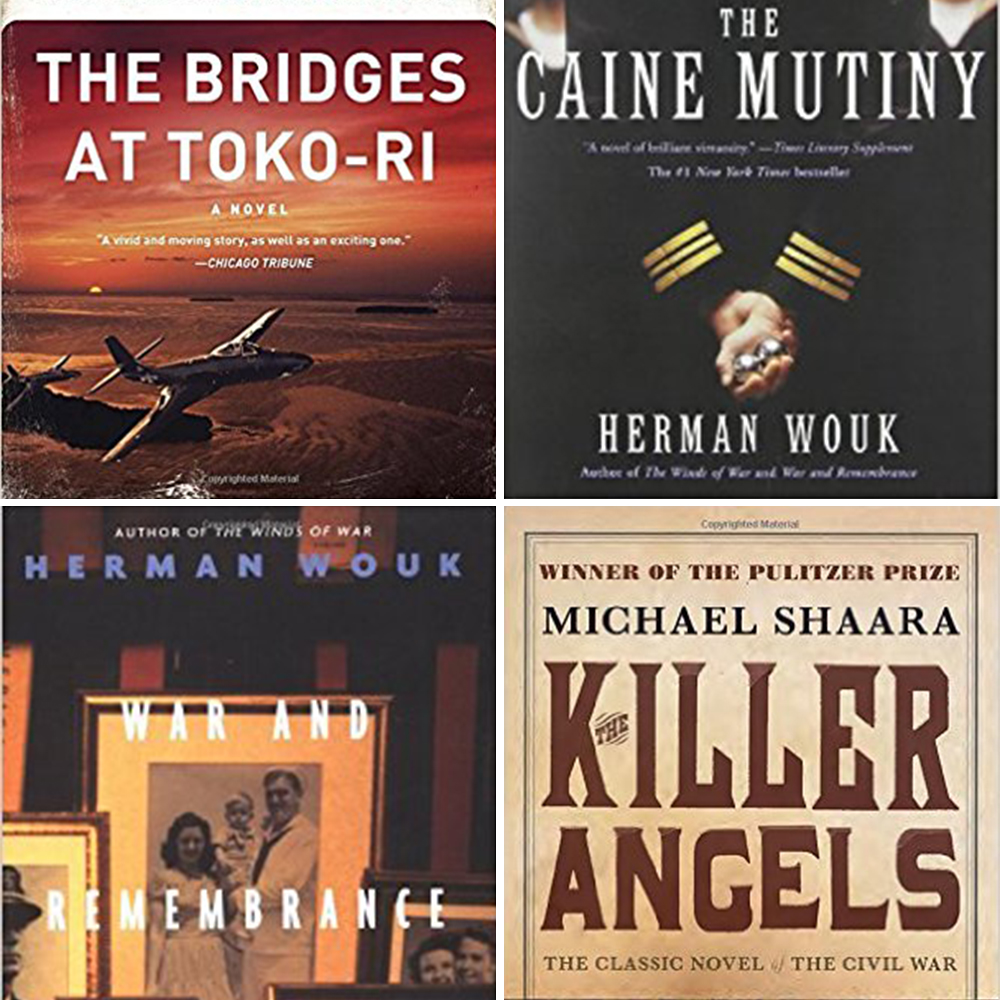Required Reading

We learn through stories, and these are some of my favorite books, fiction and non-fiction that have influenced me as an author and in life. If you read for fun or professional growth, consider adding them to your library. Next to each I have a short “why.”
Fiction
The Killer Angels – Shaara presents Civil War enemies Lee, Longstreet, Meade and Chamberlain as troubled men under extreme pressures. Historic fiction at its finest.
The Caine Mutiny – WWII was not all glory and honor. Wouk is the master at making his characters human, warts and all, and making us consider how we treat others in a timeless classic for the ages. It is a must-read for all active duty officers.
War and Remembrance – Wouk weaves in interpersonal drama with fascinating historical analysis of how WWII was fought. He and Shaara are masters of historic fiction and writers I try to emulate.
The Bridges at Toko-Ri – This novella and Academy-award movie blockbuster about carrier aviators in the Forgotten War does not have a happy ending. Michener’s immortal line, “Where do we get such men?” resonates with all veterans.
The Lords of Discipline – based on Conroy’s experience at The Citadel, it shows the dark side of the zero-defects mentality in people and organizations. It can kill.
Raise the Titanic – stayed up all night freshman year reading this one. Cussler is the master of action and suspense.
The Hunt for Red October – Clancy started the techno-thriller genre with this amazing novel. Real and human, and written before the internet, Clancy went up to the line of classified – and looked over it.
The Kite Runner – Hosseini moves one to tears with stories of the unspeakable cruelty man is capable of. A Thousand Splendid Suns is right behind.
All Quiet on the Western Front – Remarque’s classic and Crane’s much shorter but still powerful The Red Badge of Courage are novels that explained the horrors of infantry combat to millions.
Dust on the Sea – The sequel to Run Silent, Run Deep; Captain Edward L. Beach mixed technical procedure with unforgettable human characters ranging from heroic to cruel to fraudulent. He explained submarine warfare to the layman but the story never lost authenticity. Captain Beach is a huge influence for me.
Flight of the Intruder – Coonts quintessential Vietnam War carrier novel about what it is really like, its place in aviation fiction is assured. It is authentic and written by an aviator who had been there and did that.
Something to Die For – thought-provoking look at what it is like to be at the tip of the spear during a military skirmish Washington orders for limited gain. Webb has been at both ends of that spectrum; all civilians working in Washington military policy circles should read and heed. Another big influencer of mine.
Non-fiction
Carnage and Culture – Classicist Victor Davis Hanson explains why through the millennia Western Civilization tends to annihilate opponents from different civilizations. All his works are brilliant, but if you (active duty officers!) read only one of his, this is it.
Black Hawk Down – Bowden’s gripping account of a bad day gone worse in Mogadishu, and like Webb’s fictional works, showed that Washington was not serious about what they asked of our soldiers.
We Were Soldiers Once, and Young – General Hal Moore’s equally gripping battlefield account of the Army’s first helicopter assault in Vietnam. Uncommon valor was not a common virtue only to the Greatest Generation. They handed it down to their kids.
Flyboys – After Flags of Our Fathers, Bradley took a look at the human face of the air war in World War II’s Pacific theater, and told us a story of the ruthless reality of warfare that our minds struggle to comprehend.
Shattered Sword – Parshall and Tully’s fascinating work on how the history-changing Battle of Midway was actually fought – and from a Japanese perspective! A must-read for all naval officers.
Last Stand of the Tin Can Sailors – A must-read for all naval officers! Hornfischers’s detailed account of arguably the United States Navy’s finest hour off Samar will leave you stunned and exhausted. Then read Neptune’s Inferno.
Six Frigates – Toll’s well researched history of how the fledgling United States invested in a navy to hold enemies at bay when the U.S. was at its weakest.
The Guns of August – Barbara Tuchman’s minute by minute history of August, 1914 is one of how human folly, assumptions, and pride led to a bloodbath of epic proportion.
Castles of Steel – Read this after the above. Massie’s spellbinding history of the WWI naval battles fought on the North Sea with big guns by Jellicoe and Beatty. A fascinating look at the Edwardian era, with royalty and alliances that finally ended with gurgling bubbles at Scapa Flow.
Nimitz – E. B. Potter wrote a biography of an officer to emulate.
Masters of the Air – The carnage of the strategic bombing air war over Europe is well known. Donald Miller puts you in the cockpits and waist gunner stations manned by scared kids who just wanted to survive the fire, following the orders of leaders who had no choice but to send them into it.
A Bridge Too Far – The colossal airborne Operation Market Garden was rushed into execution. Ryan shows what happens when leaders do that without thinking through all the contingencies. Logistics are for professionals.
Assault on the Liberty – In this little-known work about a little-known action, Ennes lays out compelling and troubling evidence that all is not as it appears inside a human story of valor.
What have I left out? Please contact me with your nominations!
2 Comments